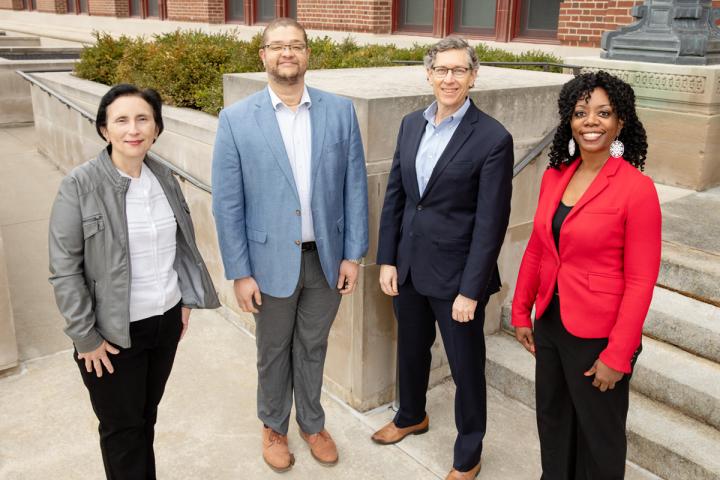
Credit: Photo by L. Brian Stauffer
CHAMPAIGN, Ill. — The chronic stress of living in neighborhoods with high rates of violence and poverty alters gene activity in immune cells, according to a new study of low-income single Black mothers on the South Side of Chicago.
The changes in stress-related gene expression reflect the body’s “hunker down” response to long-term threat, a physiological strategy for lying low and considering new actions rather than launching an immediate “fight-or-flight” response. This has implications for health outcomes in communities of color and other marginalized populations, said researchers at the University of Illinois Urbana-Champaign and collaborators at the University of Kentucky and UCLA. The researchers published the study in the journal Psychoneuroendocrinology.
“The question we asked is, how does stress get under the skin to affect health and wellness? We wanted to hear the stories of low-income single Black mothers on the South Side of Chicago and really try to understand what it’s like to live in neighborhoods with high levels of violence and how it affects these women,” said study leader Ruby Mendenhall, an Illinois professor of African American studies and of sociology, and the assistant dean for diversity and democratization of health innovation at the Carle Illinois College of Medicine.
Mendenhall’s group surveyed 68 women from high-violence neighborhoods. They shared stories, filled out stress assessments and gave blood samples.
From the women’s accounts and surveys, as well as from police records of violent crime, the researchers measured levels of stress related to racism, poverty and neighborhood violence.
Then, the researchers studied how genes related to stress and immunity were expressed in white blood cells, called leukocytes, found in the participants’ blood samples.
“Leukocytes are part of the immune system. They become activated to help fight disease and infection, and also respond to certain stress hormones, and that means their genes are good indicators for the effects of stress on health and well-being,” said study co-author Gene Robinson, an entomology professor and the director of the Carl R. Woese Institute for Genomic Biology and interim dean of the College of Liberal Arts and Sciences at the U. of I.
When looking at genes associated with a flight-or-flight stress pathway, the researchers saw no significant differences between participants who perceived their neighborhoods as dangerous and those who did not. However, they found that women who reported greater neighborhood danger showed significantly greater activity of genes regulated by the glucocorticoid receptor – a stress-response pathway that previously has been documented in animals’ hunker-down response to persistent, overwhelming threat, said study co-author Steve Cole, a professor at UCLA.
“These hunker-down responses are the body’s strategy for conserving resources and persevering in the face of overwhelming adversity,” Cole said. “Instead of preparing to fight or flee, the body bides its time and preserves itself for better days in the future. But it’s important to get to that better future, or the hunkered-down body may not do the ongoing maintenance work needed for optimal health.”
The distinction between the two stress pathways is important for planning health interventions and improving health outcomes, said study co-author Clare Rittschof, a professor at the University of Kentucky and former postdoctoral researcher in Robinson’s group.
“Increased glucocorticoid activity is typically associated with aging, so it’s as if these women are showing signs of accelerated aging, which is thought to be one reason that stress can lead to worse health outcomes,” Rittschof said.
Next, the researchers are exploring the cultural coping mechanisms the Black women in the study community rely on in their daily lives, as well as training health care and social services providers and policymakers on ways to decrease stress, improve health outcomes, decrease disparities and foster health equity.
“These efforts must be coupled with policies broadly aimed to eliminate structural racism in our society, a big source of stress for African Americans,” the authors said in a joint statement. “This is consistent with medical schools around the country declaring racism as a health crisis, including the Carle Illinois College of Medicine.”
###
Illinois graduate student Meggan Lee, Illinois professors Andrew Greenlee and Sandra Rodriguez-Zas, and Vanderbilt University professor Kedir Turi were co-authors of the paper. The University of Illinois Urbana-Champaign, the Richard and Margaret Romano Professorial Scholarship and the USC/UCLA Center on Biodemography and Population Health supported this work.
Editor’s notes: To reach Ruby Mendenhall, email [email protected]. To reach Gene Robinson, email [email protected]. To reach Clare Rittschof, email [email protected].
The paper “Transcriptomic analyses of black women in neighborhoods with high levels of violence” is available online.
Media Contact
Liz Ahlberg Touchstone
[email protected]
Original Source
https:/
Related Journal Article
http://dx.




